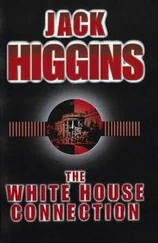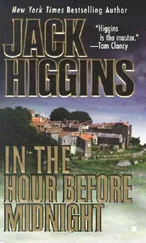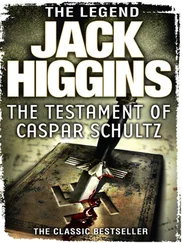Jack Higgins - The Bormann Testament (The Testament of Caspar Schultz)
Здесь есть возможность читать онлайн «Jack Higgins - The Bormann Testament (The Testament of Caspar Schultz)» — ознакомительный отрывок электронной книги совершенно бесплатно, а после прочтения отрывка купить полную версию. В некоторых случаях можно слушать аудио, скачать через торрент в формате fb2 и присутствует краткое содержание. Жанр: Триллер, на английском языке. Описание произведения, (предисловие) а так же отзывы посетителей доступны на портале библиотеки ЛибКат.
- Название:The Bormann Testament (The Testament of Caspar Schultz)
- Автор:
- Жанр:
- Год:неизвестен
- ISBN:нет данных
- Рейтинг книги:5 / 5. Голосов: 1
-
Избранное:Добавить в избранное
- Отзывы:
-
Ваша оценка:
- 100
- 1
- 2
- 3
- 4
- 5
The Bormann Testament (The Testament of Caspar Schultz): краткое содержание, описание и аннотация
Предлагаем к чтению аннотацию, описание, краткое содержание или предисловие (зависит от того, что написал сам автор книги «The Bormann Testament (The Testament of Caspar Schultz)»). Если вы не нашли необходимую информацию о книге — напишите в комментариях, мы постараемся отыскать её.
The Bormann Testament (The Testament of Caspar Schultz) — читать онлайн ознакомительный отрывок
Ниже представлен текст книги, разбитый по страницам. Система сохранения места последней прочитанной страницы, позволяет с удобством читать онлайн бесплатно книгу «The Bormann Testament (The Testament of Caspar Schultz)», без необходимости каждый раз заново искать на чём Вы остановились. Поставьте закладку, и сможете в любой момент перейти на страницу, на которой закончили чтение.
Интервал:
Закладка:
He stood up and gave Chavasse a gentle push. “And now I think we had better leave events to take their course.”
As they crossed the wide lawn, rain started to fall and they hurried along the path, passed out through the gate in the hedge, and climbed into the car. Von Kraul drove back the way they had come, and they passed Blankenese station and moved on toward Hamburg.
After a while, they came to a beer house on a corner and von Kraul stopped the car and said, “I think we are entitled to drink, my friend.”
Chavasse nodded and they went inside. Von Kraul gave him a cheroot and they sat in silence over two glasses of brandy. Finally, von Kraul said, “You feel a little better now?”
Chavasse managed a smile. “I acted like a beginner on my first job. I’m sorry. When he boasted about what he’d done to her, I lost control.”
“Under the circumstances, it was understandable,” von Kraul said, “but my way was better. Police inspector suffering from brainstorm shoots well-known Hamburg industrialist and then commits suicide. The trimmings they give the story do not really matter. It is the result which counts.”
“But why did you want to handle it that way?” Chavasse said.
Von Kraul sighed. “Can you imagine how difficult it would have been to have proved your allegations against Nagel? Even Steiner would have presented us with quite a problem. Unfortunately, such people have many powerful sympathizers. A long drawn-out legal battle could have lasted for years.”
“I suppose you’re right,” Chavasse said. “So that wraps it up. I won’t be taking much back with me. Bormann was dead in the first place and his memoirs have gone up in smoke.”
“But you have been of great assistance to Germany, if I may say so,” Colonel von Kraul said.
Chavasse shrugged and said bitterly, “Yes, I suppose you could say that.”
Von Kraul placed his glass very carefully down upon the table, and when he spoke, there was a slight edge of emotion in his voice. “Presumably, this means nothing to you? Are we still fighting the war fifteen years later?”
Chavasse was immediately sorry. “I’m sorry if I sounded offhand. I didn’t mean to be.”
Von Kraul finished his brandy and stared into the empty glass. “Were you aware of the fact that at no time did the Nazis ever achieve a vote of more than thirty-seven percent, Herr Chavasse?”
Chavasse was surprised. “No, I can’t say I was.”
“Then tell me something else and be perfectly honest,” von Kraul said. “You are a Frenchman by birth and English by adoption, so you are an authority on two great nations. How many men have you met of both countries who you consider would have made conscientious members of the SS or some similar organization?”
“A hell of a lot,” Chavasse said.
“Thank you!” Von Kraul smiled slightly. “Perhaps you will not be too harsh on us in the future.” He got to his feet. “Are you ready, my friend?”
Chavasse shook his head. “No, I think I’ll stay and have another. Don’t worry about me. I’ll make my own way back.”
Von Kraul held out his hand. “A real pleasure, Herr Chavasse. Perhaps our paths will cross again. I hope so.” For a moment he appeared to hesitate, and then he said, “Forgive me for stating the obvious, but time is a great healer.” He turned without waiting for a reply and went outside.
Chavasse ordered another brandy and sat there for a little while longer, thinking about von Kraul’s last remark, but it didn’t help. It didn’t help at all. Suddenly the noise and the bustle and the cheerful laughter of the beer house was too much for him and he got to his feet and left, pushing his way roughly through a party of people who were at that moment coming in through the door.
As he walked along the pavement, collar turned up against the rain, a car drew up beside him and Sir George Harvey said, “Hello there, Chavasse. I thought it was you. Can I give you a lift?”
Chavasse hesitated, and then climbed in beside him without a word. As they moved away, Sir George said excitedly, “Terrible business at Nagel’s reception. Absolutely astounding. Somebody shot him and then committed suicide!”
Chavasse lit a cigarette and said carefully, “Were you there when they discovered the bodies?”
Sir George shook his head. “No, we were all requested to leave. The excuse given was that Nagel had met with an accident. Naturally, I was curious and had a word with one of the servants on the way out. He gave me the details.”
“Have they identified the man who killed him yet?” Chavasse said.
“Not as far as I know,” Sir George told him. “The police had just arrived as I left.” Chavasse didn’t say anything more, and Sir George looked sideways at him curiously. “You don’t know anything about it, do you?”
Chavasse nodded slowly. “I should imagine they’ll just be discovering that the dead man is Inspector Steiner of the Hamburg police.”
The car slewed violently and Sir George fought for control, and finally brought it to a standstill. He took a handkerchief and mopped his brow. “Sorry about that,” he said, “but to be perfectly frank, you rather took the wind out of my sails.” Chavasse didn’t reply, and after a moment of silence Sir George went on. “I suppose it all ties in with the Bormann affair?”
Chavasse wound down the window and flicked his cigarette out into the rain. “There is no Bormann affair any longer. It’s finished, all wrapped up.”
Sir George frowned. “But what about the manuscript?”
“A heap of ashes,” Chavasse said. “I’m afraid Steiner was just one step in front of me.”
Out of the silence that followed, Sir George said awkwardly, “And Miss Hartmann?”
For a moment, the words refused to come, but Chavasse swallowed hard and forced them out. “I’m afraid he got to her as well.”
Sir George turned slowly and looked at him, horror in his eyes. “You mean she’s dead?”
Chavasse didn’t bother replying, and they sat there for some time in silence. After a while, Sir George said, “Is there anywhere I can take you?”
Chavasse nodded slowly. “Yes, I think I’d like to go back to her apartment, if you don’t mind.”
Sir George nodded, seemingly too full of emotion to speak, and switched on the engine. A moment later, they were continuing through the heavy rain toward the center of Hamburg.
When they reached the house, Chavasse got out quickly and Sir George kept the engine running. He leaned out of the side window and said, “Is there anything more I can do for you?”
Chavasse shook his head. “No, I’ll be fine, thanks.”
“I’m leaving on the afternoon train tomorrow,” Sir George went on. “Will I see you again before I go?”
Chavasse nodded slowly. “I’ll probably be returning by that train myself. I’ve nothing to hang on here for any longer.”
Sir George smiled tightly. “I won’t say good-bye then. If I don’t see you on the train, we must certainly have a drink together on the boat going over.” He let in the clutch and the Mercedes moved away quickly, leaving Chavasse alone on the edge of the pavement.
He went upstairs slowly, taking his time, reluctant to go into the empty apartment. He hesitated outside for a moment, and then took out the master key the caretaker’s wife had given him, and unlocked the door.
As he turned the handle, he became aware of a slight flurry of movement inside. For a moment he hesitated, and then flung the door open and went into the room half-crouching, his hands ready.
Mark Hardt was standing in the center of the room. He was wearing a heavy driving coat, but his trousers were wet and clung to his legs. His face looked white and tense, and when he saw Chavasse he relaxed with a deep sigh. “You had me worried for a moment.”
Читать дальшеИнтервал:
Закладка:
Похожие книги на «The Bormann Testament (The Testament of Caspar Schultz)»
Представляем Вашему вниманию похожие книги на «The Bormann Testament (The Testament of Caspar Schultz)» списком для выбора. Мы отобрали схожую по названию и смыслу литературу в надежде предоставить читателям больше вариантов отыскать новые, интересные, ещё непрочитанные произведения.
Обсуждение, отзывы о книге «The Bormann Testament (The Testament of Caspar Schultz)» и просто собственные мнения читателей. Оставьте ваши комментарии, напишите, что Вы думаете о произведении, его смысле или главных героях. Укажите что конкретно понравилось, а что нет, и почему Вы так считаете.












